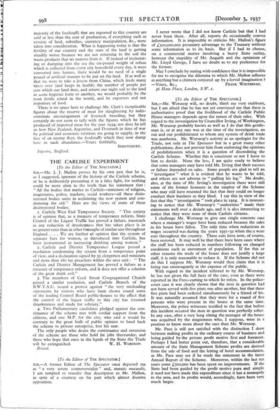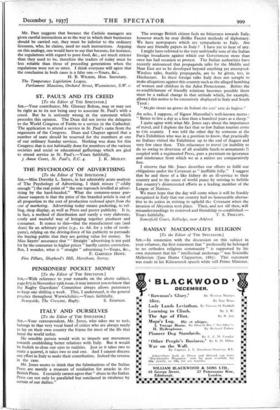[To the Editor of THE SPECTATOR.] SIR,—Mr. Worsnop will, no
doubt, think me very stubborn, but I am afraid that he has not yet convinced me that there is authoritative proof that the livelihood of the Carlisle Public House managers depends upon the extent of their sales. With regard to the investigation by Councillor Irving, of Workington, Mr. Worsnop probably knows as well as I do that this gentle- man is, or at any rate was at the time of the investigation, an out and out prohibitionist to whom any system of drink trade was anathema. Mr. Worsnop's activity as an apologist for the Trade, not only in The Spectator but in a great Many other publications, does not prevent him from endorsing the opinions of prohibitionists when it is a question of discrediting the Carlisle Scheme. Whether this is consistent or not I leave to him to decide. None the less, I am quite ready to believe that some managers may have told Mr. Irving that their success or failure depended on sales. Some people are glad to tell an " investigator " what it is evident that he wants to be told, and others are not adverse to " pulling his leg." No doubt, also, at the time of Mr. Irving's investigation there were still some of the former licensees in the employ of the Scheme who may still have resented the fact that they could no longer conduct their business as they liked. I say this in view of the fact that this " investigation " took place in 1924. It is interest- ing to notice that Mr. Worsnop's " authorities " made their statements well over a decade ago, and it is also interesting to notice that they were none of them Carlisle citizens.
I challenge Mr. Worsnop to give one single concrete case where a manager's wages have been reduced because the sales in his house have fallen. The only time when reductions in wages occurred was during the years 1931-32 when the: e were cuts throughout the country. These cuts have now, of course, been restored. It may well be that there have been cases where the staff has been reduced in numbers following on changed conditions such as movement of population. If for this or other reasons the trade of the house does not justify a large staff, it is only reasonable to reduce it. If the Scheme did not do this I suppose Mr. Worsnop would then claim that it is being run extravagantly at the expense of the public.
With regard to the incident referred to by Mr. Worsnop, he has not given the full facts of the case, even as these were reported in the Press-cutting to which he refers. In the police- court case it was clearly shown that the man in question had not been served with five pints one after another, but that these five pints had been ordered simultaneously by a friend of his. It was naturally assumed that they were for a round of five persons who were present in the house at the same time. Moreover, the police witnesses testified to the fact that before this incident occured the man in question was perfectly sober. In any case, after a very long sitting the manager of the-house was acquitted by the magistrates who, I suppose, were in a position to know more about- the case than Mr. Worsnop.
Mr. Pace is still not satisfied with the distinction I drew between making profits in the ordinary course of business and being guided by the private profit motive first and foremost. Perhaps I had better point out, therefore, that a considerable amount of the State Management Scheme profits are derived from the sale of food and the letting of hotel accommodation, as Mr. Pace may see if he reads the statement in the latest Annual Report of the Scheme. Moreover, within the last ten years some £5oopoo has-been spent on improvements. If the State had been guided by the profit motive pure and simple it need not have made this expenditure since it has a monopoly in the area, and its profits would, accordingly, have been very much larger. Mr. Pace suggests that because the Carlisle managers are given careful instructions as to the way in which their businesses should be carried out, they must be inferior to the 'ordinary • licensees, who, he claims, need no such instructions: Arguing on this analogy, one would have to say that because, for instance, the regulations with regard to pure food, &c., are much stricter than they used to be, therefore the traders of today must be less reliable than those of preceding geneiations when the regulations were not so strict. I think everyone will agree that the conclusion in both cases is a false one.—Yours, &c., 11: B. WnsoN, Hon. Secretary. The Temperance Legislation League, Parliament Mansions, Orchard Street, Westminster, S.W. r.



























































 Previous page
Previous page